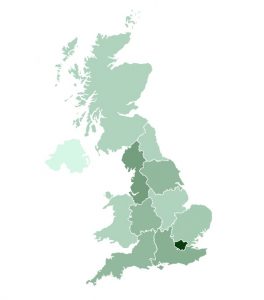Good news for productivity and inclusion in the North West…

Start up loans across the UK (Source: Start Up Loans)
The North West has overtaken the South East as the region receiving the highest number of government-backed start-up loans outside London, according to recent news by the British Business Bank. Data from the Government-backed scheme shows that of the £500m, the North West region received 7,841 loans worth £60 million. The region was followed by the South East with 5,680 loans worth £48 million, Yorkshire and The Humber with 5,377 loans worth £44 million, 3,879 loans in Scotland worth £29 million and 2,904 loans in Wales worth £26 million. In relation to the composition of recipients, almost 40% of loan recipients are women and 22% of recipients come from BAME backgrounds. Among the funded businesses in the North West region are a couple from Cumbria who opened a plastic-free supermarket –Cut the Wrap!; a father from Manchester who created a brand of healthy snacks for children –Naturelly.
Patrick Magee, Chief Commercial Officer of the British Business Bank, said:
“We’re absolutely delighted that we have supported so many fantastic small business owners from up and down the country. The hard work and determination of the UK’s 5.7 million small businesses make a huge contribution to society, and it’s great to see latest research showing that the economic benefits of the Start Up Loans programme are nearly six times its economic costs.
“We’re committed to helping small businesses prosper and grow and we look forward to supporting many more in the future.” (Source: British Business Bank)
What the Start Up Loans scheme is
The Start Up Loans scheme, part of the British Business Bank (BBB), provides since 2012 private loans for businesses up to £25,000 at a 6% fixed interest rate per annum and offers free dedicated mentoring and support to each business. The funding for the scheme is provided by the Department for Business, Energy and Industrial Strategy (BEIS).
What the Start Up Loans scheme has achieved
The aim of the scheme has been to offer funding to start-up businesses that usually are not supported by mainstream finance providers. It also attempts to break through the barriers to accessing appropriate external advice for people looking to start a new business. According to analysis of ‘self-reported’ data, the 2019 evaluation report highlights that the program has supported the start-up and/or early growth of new businesses, and demonstrated additionality, in line with the evaluation in Years 1 and 2. The report also finds that those benefiting more from the program are individuals with no previous business experience and those that were unemployed at the time of applying to the program. Interestingly, despite its role as a core component of the program, the offer, take-up and delivery of mentoring appears to lack consistency across the program.
How do people access finance?
Evidence from the British Business Bank 2017 Business Finance Survey reveals that banks are the most common port of funding access. When in need of a loan, start ups founders would rely on their bank to access finance, with a very small portion (6%) asking a financial adviser or accountant for suggestions. In short, most SMEs do not seek advice when applying for finance. Yet, mainstream banks tend to not lend until start-ups have at least two/three years trading history, according to the BBB report.
What this means for inclusion and productivity
There are some regional benefits of this funding scheme, related to perceptions of: raising levels of business start-up and entrepreneurship in the area; providing access to employment opportunities via self-employment and enterprise that led to reduced unemployment levels; and reducing reliance on benefits/Job Seekers Allowance.
What the BBB report highlights is how these schemes can produce benefits beyond regional productivity, to enhance personal development and inclusion. Not surprisingly, mentoring plays a key role in access and success of funding recipients. The BBB report suggests that received more than 6 hours of mentoring were more likely to see growth in their business sales. This raises some key questions: who has access to mentoring opportunities? Who are the available mentors? How are these mentors representative of the population applying for funding? How is seeking access to mentoring perceived by funding bodies? It would be interesting to understand whether women and people from BAME backgrounds are equally represented in the mentors choices and availability and how they are evaluated in their funding proposals in relation to access/use of mentoring schemes.
Education also plays a fundamental role, with those having a degree being more likely to increase the sales of their business, and to have higher sales in the current financial year.
Personal and business confidence –also discussed in another post in this blog– of beneficiaries is linked to their previous business experience. Those unemployed at the time of entering the program were more likely to increase their business and personal confidence compared to those that were in employment. Overall, the report suggests that engaging in substantial levels of mentoring and increasing individuals’ business and personal confidence.
